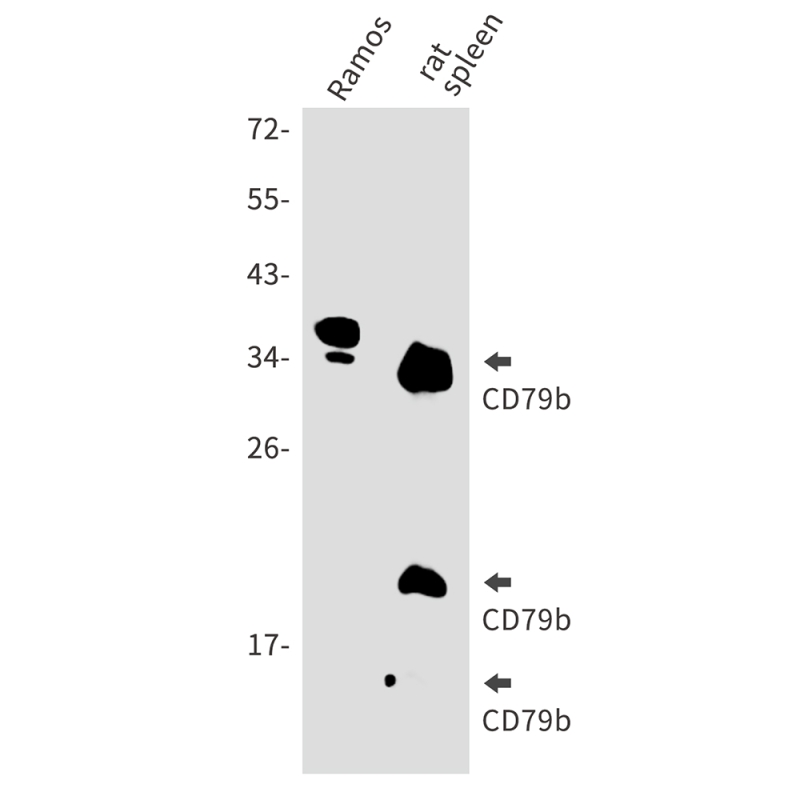
| WB | 1/500-1/1000 | Human,Mouse,Rat |
| IF | 1/20 | Human,Mouse,Rat |
| IHC | 1/50-1/100 | Human,Mouse,Rat |
| ICC | 1/50-1/200 | Human,Mouse,Rat |
| FCM | 1/50-1/100 | Human,Mouse,Rat |
| Elisa | 咨询技术 | Human,Mouse,Rat |
| Aliases | CD79B; AGM6; B29; IGB |
| Entrez GeneID | 974 |
| WB Predicted band size | Calculated MW: 26 kDa; Observed MW: 30-50 kDa |
| Host/Isotype | Rabbit IgG |
| Antibody Type | Primary antibody |
| Storage | Store at 4°C short term. Aliquot and store at -20°C long term. Avoid freeze/thaw cycles. |
| Species Reactivity | Human,Mouse,Rat |
| Immunogen | A synthetic peptide of human CD79b |
| Formulation | Purified antibody in TBS with 0.05% sodium azide,0.05%BSA and 50% glycerol. |
+ +
以下是3篇关于CD79B抗体的代表性文献摘要:
---
1. **文献名称**: *Polatuzumab Vedotin in Relapsed or Refractory Diffuse Large B-Cell Lymphoma*
**作者**: Sehn, L.H. 等 (2019)
**摘要**: 研究评估了抗体药物偶联物Polatuzumab vedotin(靶向CD79B)联合化疗方案在复发/难治性弥漫大B细胞淋巴瘤(DLBCL)患者中的疗效。结果显示,与标准治疗相比,联合治疗显著提高缓解率和生存期,证实CD79B作为治疗靶点的潜力。
---
2. **文献名称**: *CD79B as a Therapeutic Target in B-Cell Malignancies*
**作者**: Dornan, D. 等 (2018)
**摘要**: 探讨CD79B在B细胞恶性肿瘤中的生物学功能及靶向策略。研究发现,针对CD79B的抗体药物偶联物可通过内化作用递送细胞毒性药物,破坏B细胞受体信号通路,并在临床前模型中抑制肿瘤生长,但耐药性与CD79B表位突变相关。
---
3. **文献名称**: *Structural Basis of CD79B Recognition by Anti-B-Cell Receptor Antibodies*
**作者**: Cheng, Z. 等 (2021)
**摘要**: 通过冷冻电镜解析CD79B胞外域与其单克隆抗体的复合物结构,揭示抗体结合表位及激活B细胞受体的分子机制,为优化CD79B靶向治疗提供结构基础。
---
4. **文献名称**: *Phase II Study of Anti-CD79B Antibody in Non-Hodgkin Lymphoma*
**作者**: Morschhauser, F. 等 (2016)
**摘要**: 早期临床试验评估CD79B单克隆抗体单药治疗非霍奇金淋巴瘤的安全性和有效性,结果显示部分患者达到持续缓解,提示其作为单药或联合用药的潜力。
---
以上文献涵盖临床疗效、机制研究、结构生物学及早期试验,反映CD79B抗体在肿瘤治疗中的多角度探索。
CD79B, a transmembrane protein encoded by the *CD79B* gene, is a critical component of the B-cell receptor (BCR) complex. It pairs with CD79A to form a heterodimer that non-covalently associates with membrane-bound immunoglobulins (IgM/IgD) on B cells. This complex is essential for BCR signaling, which governs B-cell development, antigen recognition, and immune response activation. CD79B contains an immunoreceptor tyrosine-based activation motif (ITAM) in its cytoplasmic domain, enabling signal transduction upon antigen binding. Phosphorylated ITAMs recruit kinases like SYK, initiating downstream pathways that drive B-cell proliferation, differentiation, and antibody production.
Antibodies targeting CD79B have gained attention in both research and clinical settings. In diagnostics, CD79B-specific antibodies help identify B-cell malignancies (e.g., non-Hodgkin lymphomas) by detecting aberrant BCR expression. Therapeutically, anti-CD79B antibodies are explored as delivery vehicles for cytotoxic agents in antibody-drug conjugates (ADCs). For example, polatuzumab vedotin, an ADC linking an anti-CD79B monoclonal antibody to a microtubule inhibitor, is approved for relapsed/refractory diffuse large B-cell lymphoma (DLBCL). CD79B’s restricted expression on mature B cells minimizes off-target effects, enhancing therapeutic specificity. Additionally, CD79B mutations or dysregulation are implicated in autoimmune disorders and lymphoma progression, making it a biomarker for disease monitoring. Ongoing research focuses on optimizing CD79B-targeted therapies to overcome drug resistance and improve outcomes in B-cell-related pathologies.
×